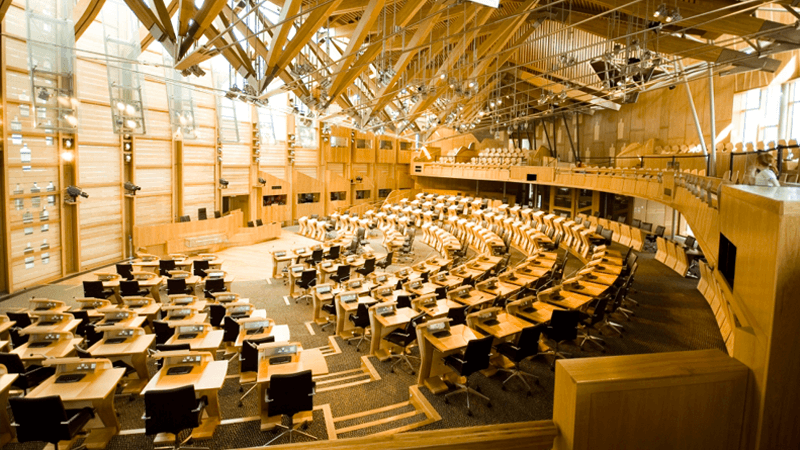Marking 20 years of the Scottish Parliament

On 12 May 1999 the Scottish Parliament was re-established for the first time in 292 years. Winnie Ewing, a leading campaigner for the change, marked the restoration of powers with these words: “The Scottish Parliament was adjourned on 25 March in the year 1707. It is hereby reconvened.”
Last month, 20 years on from devolution, Holyrood held a special gathering attended by Her Majesty the Queen, Prince Charles, and Members of the Scottish Parliament (MSPs).
The great and the good of Scottish society assembled to watch as the Queen addressed the Chamber and speeches were delivered by party leaders. Musicians played, and the Scots Poet Laureate read a poem which was translated into Gaelic.
The day was a celebration of devolution and Scottish culture more generally. Many in Scotland will have welcomed this. Over the last 20 years, around 300 pieces of legislation have been passed, affecting the lives of millions of Scots.
‘Progressive’ Scotland
However, it soon became apparent that the event was more than just a marker of Scottish devolution. It was a public declaration of the values which the political classes believe shape life in Scotland today.
Opening the ceremony, Ken Macintosh MSP, Presiding Officer of the Scottish Parliament, was unambiguous. Holyrood, he said, “has adapted to a country that is changing and has changed from a socially conservative country to a progressive one.” To a country where “yet again last week the Parliament flew the pride flag.”
Each of the party leaders cited same-sex marriage as a major achievement of the last 20 years – the marker of a modern, ‘progressive’ Scotland.
He added, “my own children may not know the hymns and the psalms that I was reared on but, like our young guests today, they know different songs – new songs for a new age”.
As the First Minister and the main party leaders stood up to speak, they all echoed his sentiments. Each of the party leaders cited same-sex marriage as a major achievement of the last 20 years – the marker of a modern, ‘progressive’ Scotland.
During her performance Jackie Kay, the Scots ‘Makar’, or poet laureate, referred to “the jubilation when same sex marriage was passed,” and “clause 28 was opposed”. In making these changes, she said, MSPs had “let auld Scotland oot, and Modern Scotland in”.
“And now – look – Old Scotland is no more. Gay men kiss at the Parliament’s door.”
Dispensing with biblical values
Spectators at the event could be left with no doubt that Scotland’s political elite no longer hold Christian beliefs about marriage and sexuality in high esteem. Only a small number of Christian MSPs still champion these values.
Of course, this hasn’t happened overnight. Over the last 20 years, lawmakers in Scotland have voted in various changes which directly oppose the Bible’s teaching on marriage, the family, sexuality, and the sanctity of life.
Civil partnerships were introduced in 2005, followed by same-sex marriage in 2014. This year, the Government announced that it will introduce heterosexual civil partnerships by 2020, further undermining marriage.
Abortion remains enshrined in law more than 50 years on from the Abortion Act 1967. Last year, more than 13,000 abortions took place in Scotland, the highest rate in ten years.
They’re a far cry from the biblical values of the Reformation.
And proposed changes to the Gender Recognition Act would allow men and women who feel trapped in the wrong body to obtain legal status as the opposite sex and access opposite-sex facilities under a system of self-declaration.
All of these changes are built on the values of atheism, secularism and postmodernism. They’re a far cry from the biblical values of the Reformation which had so profound an impact on Scottish society that Scotland became known as the ‘land of the book’.
Looking forward
A societal move away from Judeo-Christian values is deeply saddening for believers. But it is also bad for society as a whole. When societies do uphold marriage, the family, and the sanctity of life this is righteousness, and “righteousness exalts a nation” (Proverbs 14:34).
We have many reasons to be thankful to God and hopeful for the future.
Yet twenty years on from Scottish devolution, we have many reasons to be thankful to God and hopeful for the future.
We know from the Bible that earthly authorities are established by God. They act as his agents of justice (Romans 13:4), maintain order (1 Peter 2:14) and steward his creation (Genesis 2:15). The Scottish Parliament is still used by God to accomplish his good purposes (Romans 8:28).
And we know that Christ has sent us the Holy Spirit as a helper (John 14) who will provide the strength we need to live out our Christian lives.
For 21st century Christians in Scotland, the challenge is the same as it was for Christians in the time of John Knox. We are to love and obey God and love our neighbours as ourselves (Mark 12:30-31). We are to act as “salt and light” (Matthew 5). And we are to work for the peace and prosperity of the culture around us (Jeremiah 29:7).
